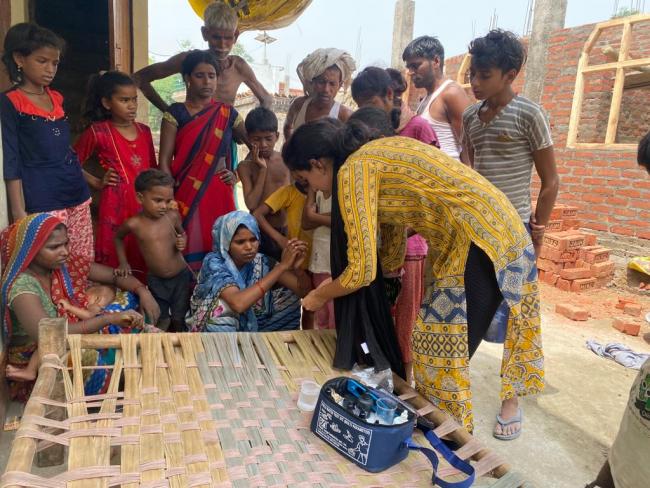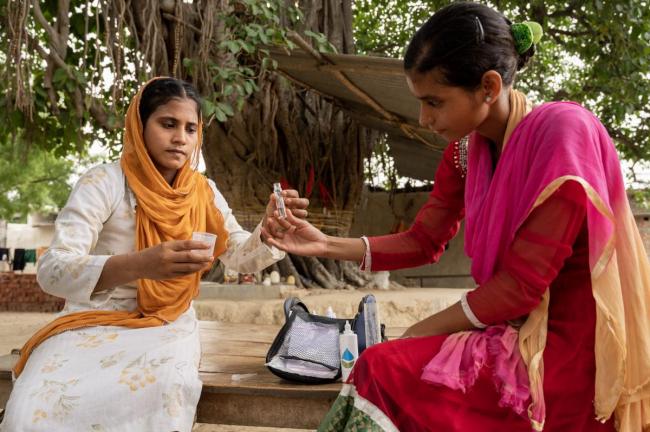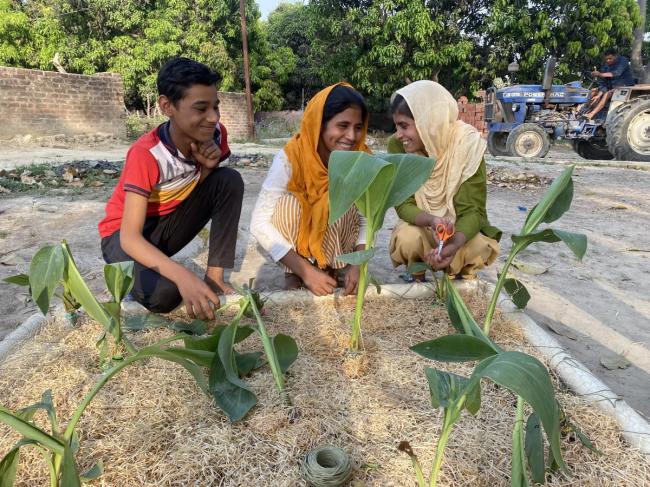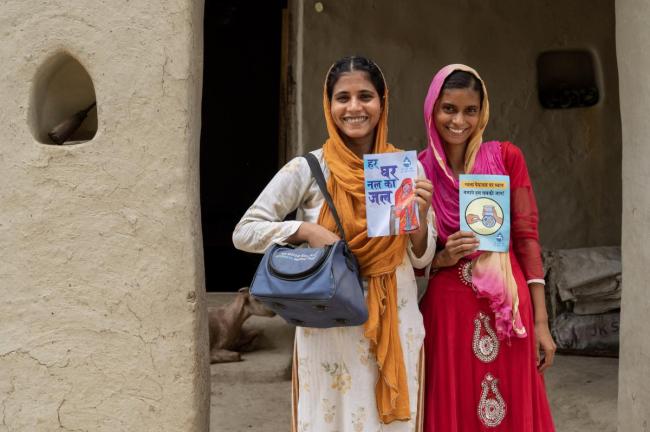Empowering young women to become the water managers of the future in India
Published on: 04/08/2022
This guest blog is written by Shivon Mehta of the Aga Khan Foundation, India
The relationship between women and water dates back thousands of years. In India, women and girls have spent hours collecting, handling and purifying water for meeting the needs of their families. These cumbersome tasks take enormous amounts of their time and energy. Although this paints an unpleasant picture about the plight of women, over the years, it has helped them in building their knowledge and experience regarding water quality (colour, taste and smell) and the adequate quantity of water required by their families. Who could be better managers of a precious natural resource like water than women?

Training on water testing
In 30 villages of Lucknow and Sitapur districts of Uttar Pradesh, the Aga Khan Foundation recently implemented a piped water supply schemes project (Har Ghar Jal/Functional Household Tap Water Connection to every household) that has been in alignment with the objectives of the Jal Jeevan Mission. The project not only identified adolescent girls as the champions of quality water, but also made them part of the Village Water Sanitation Committee/Paani Samiti, the nodal committee responsible for planning, implementation, and operation and maintenance (O&M) of in-village water supply infrastructure. The intervention has been a community-driven model of initiating institutional reforms, while creating an environment for capacity building and improved participation of local bodies and women in decision-making processes related to the implementation and O&M of water supply systems.
However, identifying women and young girls as community leaders for training on the technical aspects of managing water supply was a slightly challenging issue. Conventionally, in rural areas, women are often expected to remain silent, shy, timid, with an expectation to perform only household chores. Hence, in our project area, to make women feel comfortable, we decided to form small groups of women and discussed with them the frequency at which they fetch water, the quality of the water they use/consume and the common diseases prevalent in the village. Thereafter, in the community meetings, we linked this information to the topic of health including the transmission of water-borne diseases such as cholera, diarrhoea, dysentery, hepatitis A, typhoid, etc. and, how water affects our lives. In this exercise, we identified a cadre of women and young girls who were committed to making positive change in their society and brought them on board. To motivate them, we shared instances of powerful, strong, and fearless women who had been Human Rights Warriors in the past.
The identified women and girls were trained on carrying out monitoring and surveillance of drinking water (sanitary risk assessment, water testing using a field-testing kit, bacteriological vials and disease surveillance). Rani, a seventeen-year girl, was one of the participants in the trainings organised in Mukeempur village of UP’s Sidhauli block, which was facilitated by the Aga Khan Foundation (AKF). Her testimony read– ‘we need to get the water tested just the way we get our health tested’. Additionally, women were trained on implementing solutions for source sustainability and greywater management in the village, that has been outlined as another critical component of the Jal Jeevan Mission.

Water quality testing using a field-testing kit
From another village called Mirzapur Mafi of the Sidhauli Block of Uttar Pradesh, two young girls, namely Sabha and Nazmi constructed a floating wetland after a training received from the AKF Team. A phytoremediation measure was created using recycled materials such as used PVC pipes, plastic bottles, and Canna indica plants to absorb nutrients like nitrogen and phosphorous from the village pond that was receiving the entire village’s grey water. Today, there is increased participation of women in the Village Water Sanitation Committee (VWSC) meetings and in decision making.

Young girls constructing a floating wetland
Now when we do field visits, these women and girls share their challenges stating that the community tries to suppress their voices, but the stories of brave and dynamic women that we had shared with them earlier, have stayed with them, and keep them motivated. Over time, we have seen them grow, learn, and disseminate their knowledge among the community.
In the last year, AKF has trained over 90 women and young girls in 40 villages of Uttar Pradesh. Although these women belong to vulnerable communities (low-income groups and minorities), today they are known as ‘Water Warriors’ and ‘Ambassadors of Water’ in their villages, playing a pivotal role in addressing the challenges of water quality and management. As a result of this effort, more than 55 drinking water sources have been tested in these intervention villages. The practice of testing water during pre- and post-monsoon seasons and during a disease outbreak not only helps ensure people’s safety, but also contributes significantly to a reduction in health-related expenditure.
AKF is committed to training these women and girls further, to enable them to enhance their skills in advanced drinking water monitoring and surveillance, greywater management and source sustainability measures.
AKF will also facilitate processes to turn them into Master Trainers, while promoting their achievements at the state level and including them as members of the State Resource Group in the capacity of Master Trainers. These women leaders have been empowered with the right knowledge and skillset to work on access to safe water and sanitation and have the capability to contribute to the effective implementation of other ongoing missions such as the Swachh Bharat Mission-2,Amrit Sarovar amongst others. This cadre of adolescent girls and women will be among the key resource persons, taking forward the agenda of the Government of India. This initiative will help pave the way for the active participation of women at all levels of institutional arrangements with special emphasis on their increased participation in decision making processes.

Women WASH champions
At IRC we have strong opinions and we value honest and frank discussion, so you won't be surprised to hear that not all the opinions on this site represent our official policy.